- Home
- Tom Stoppard
Tom Stoppard Plays 3 Page 2
Tom Stoppard Plays 3 Read online
Page 2
BROWN: I must congratulate you on your hospital, it’s a lovely place you run here. Everyone is so nice.
MATRON: Well, thank you, Mr Brown. I’m glad you feel at home.
(MAGGIE takes Brown’s tray.)
BROWN: I never felt it there. Very good breakfast. Just what the doctor ordered. I hope he got a bit of a lie-in.
(MAGGIE exits with the tray, closing the door.)
MATRON: Now, what’s your problem, Mr Brown?
BROWN: I have no problems.
MATRON: Your complaint.
BROWN: I have no complaints either. Full marks.
MATRON: Most people who come here have something the matter with them.
BROWN: That must give you a lot of extra work.
MATRON: But it’s what we’re here for. You see, you can’t really stay unless there’s something wrong with you.
BROWN: I can pay.
MATRON: That’s not the point.
BROWN: What is the point?
MATRON: This is a hospital. What are you after?
BROWN: (Sadly) My approach is too straightforward. An ordinary malingerer or a genuine hypochondriac wouldn’t have all this trouble. They’d be accepted on their own terms. All I get is a lot of personal questions. (Hopefully.) Maybe I could catch something … But what difference would it make to you?
MATRON: We have to keep the beds free for people who need them.
BROWN: I need this room.
MATRON: I believe you, Mr Brown – but wouldn’t another room like this one do? Somewhere else? You see, we deal with physical matters – of the body –
BROWN: There’s nothing wrong with my mind. You won’t find my name on any list.
MATRON: I know.
BROWN: (Teasing) How do you know?
(She doesn’t answer.)
Go for the obvious, it’s worth considering. I know what I like: a nice atmosphere – good food – clean rooms – no demands – cheerful staff – Well, it’s worth the price. I won’t be any trouble.
MATRON: Have you thought of going to a nice country hotel?
BROWN: Different kettle of fish altogether. I want to do nothing, and have nothing expected of me. That isn’t possible out there. It worries them. They want to know what you’re at – staying in your room all the time – they want to know what you’re doing. But in a hospital it is understood that you’re not doing anything, because everybody’s in the same boat – it’s the normal thing.
MATRON: But there’s nothing wrong with you!
BROWN: That’s why I’m here. If there was something wrong with me I could get into any old hospital – free. As it is, I’m quite happy to pay for not having anything wrong with me.
MATRON: But what do you want to do here?
BROWN: Nothing.
MATRON: You’ll find that very boring.
BROWN: One must expect to be bored, in a hospital.
MATRON: Have you been in a hospital quite a lot?
BROWN: No. I’ve been saving up for it … (He smiles.)
SCENE 5
The hospital office. The DOCTOR is phoning at a desk.
DOCTOR: No luck? … Oh. Well, I don’t know. The only plan we’ve got is to bore him out of here, but he’s disturbingly self-sufficient … Mmmm, we’ve had a psychiatrist over … Well, he seemed amused … Both of them, actually; they were both amused … No, I shouldn’t do that, he won’t tell you anything. And there’s one of our nurses – she’s getting on very well with him … something’s bound to come out soon …
SCENE 6
Brown’s ward. BROWN is in bed with a thermometer in his mouth. MAGGIE is taking his pulse. She removes the thermometer, scans it and shakes it.
MAGGIE: I’m wasting my time here, you know.
BROWN: (Disappointed) Normal?
MAGGIE: You’ll have to do better than that if you’re going to stay.
BROWN: You’re breaking my heart, Maggie.
MAGGIE: (Almost lovingly) Brownie, what are you doing to do with yourself?
BROWN: Maggie, Maggie … Why do you want me to do something?
MAGGIE: They’ve all got theories about you, you know.
BROWN: Theories?
MAGGIE: Train robber.
BROWN: That’s a good one.
MAGGIE: Embezzler.
BROWN: Naturally.
MAGGIE: Eccentric millionaire.
BROWN: Wish I was. I’d have my own hospital, just for myself – with nurses, doctors, rubber floors, flowers, stretchers parked by the elevators, clean towels and fire regulations …
MAGGIE: It’s generally agreed you’re on the run.
BROWN: No, I’ve stopped.
MAGGIE: I think you’re just lazy.
BROWN: I knew you were the clever one.
MAGGIE: (Troubled, soft) Tell me what’s the matter, Brownie?
BROWN: I would if there was.
MAGGIE: What do you want to stay here for, then?
BROWN: I like you.
MAGGIE: You didn’t know I was here.
BROWN: That’s true. I came for the quiet and the routine. I came for the white calm, meals on trays and quiet efficiency, time passing and bringing nothing. That seemed enough. I never got it down to a person. But I like you – I like you very much.
MAGGIE: Well, I like you too, Brownie. But there’s more in life than that.
(MATRON enters.)
MATRON: Good morning.
BROWN: Good morning, Matron.
MATRON: And how are we this morning?
BROWN: We’re very well. How are you?
MATRON: (Slightly taken aback) I’m all right, thank you. Well, are you enjoying life?
BROWN: Yes, thank you, Matron.
MATRON: What have you been doing?
BROWN: Nothing.
MATRON: Now really, Mr Brown, this won’t do, you know. Wouldn’t you like to get up for a while? Have a walk in the garden? There’s no reason why you shouldn’t.
BROWN: No, I suppose not. But I didn’t come here for that. I must have walked thousands of miles, in my time.
MATRON: It’s not healthy to stay in bed all day.
BROWN: What do the other patients do?
MATRON: The other patients are here because they are not well.
BROWN: I thought patients did things … (Vaguely) made things.
MATRON: I suppose you wouldn’t like to make paper flowers?
BROWN: What on earth for? You’ve got lots of real ones.
MATRON: You haven’t got any.
BROWN: Well, no one knows I’m here.
MATRON: Then you must tell somebody.
BROWN: I don’t want them to know.
MATRON: Who?
BROWN: Everybody.
MATRON: You’ll soon get tired of sitting in bed.
BROWN: Then I’ll sit by the window. I’m easily pleased.
MATRON: I can’t let you languish away in here. You must do something.
BROWN: (Sighs) All right. What?
MATRON: We’ve got basket-weaving …?
BROWN: Then I’ll be left alone, will I?
SCENE 7
The hospital office. The DOCTOR is on the phone.
DOCTOR: Well, I don’t know – how many John Browns are there in Somerset House? … Good grief! … Of course, if it’s any consolation it may not be his real name … I know it doesn’t help … That’s an idea, yes … His fingerprints … No, no, I’ll get them on a glass or something – Well, he might have been in trouble some time …
SCENE 8
Brown’s ward. BROWN is working on a shapeless piece of basketry.
MATRON enters.
MATRON: What is it?
BROWN: Basketwork.
MATRON: But what is it for?
BROWN: Therapy.
MATRON: You’re making fun of me.
BROWN: It is functional on one level only. If that. You’d like me to make a sort of laundry basket and lower myself in it out of the window. That would be functional on two levels. At least.<
br />
(Regards the mess sadly.) And I’m not even blind.
(MATRON silently dispossesses BROWN of his basketry.)
MATRON: What about painting, Mr Brown?
(That strikes a chord.)
BROWN: Painting … I used to do a bit of painting.
MATRON: Splendid. Would you do some for me?
BROWN: Paint in here?
MATRON: Nurse Coates will bring you materials.
BROWN: What colours do you like?
MATRON: I like all colours. Just paint what you fancy. Paint scenes from your own life.
BROWN: Clever! Should I paint my last place of employment?
MATRON: I’m trying to help you.
BROWN: I’m sorry. I know you are. But I don’t need help. Everything’s fine for me. (Pause.) Would you like me to paint the countryside?
MATRON: Yes, that would be nice.
SCENE 9
The hospital office. The DOCTOR is on the phone.
DOCTOR: No … well, we haven’t got anything against him really. He’s not doing any harm. No, he pays regularly. We can’t really refuse … He’s got lots left …
SCENE 10
Brown’s ward. BROWN is painting a landscape all aver one wall. He hasn’t got very far, but one sees the beginnings of a simple pastoral scene, competent but amateurish. MAGGIE enters, carrying cut flowers in a vase.
MAGGIE: Hello – (She notices.)
BROWN: I’ll need some more paint.
MAGGIE: (Horrified) Brownie! I gave you drawing paper!
BROWN: I like space. I like the big sweep – the contours of hills all flowing.
MAGGIE: Matron will have a fit.
BROWN: What are the flowers?
MAGGIE: You don’t deserve them.
BROWN: Who are they from?
MAGGIE: Me.
BROWN: Maggie!
MAGGIE: I didn’t buy them.
BROWN: Pinched them?
MAGGIE: Picked them.
BROWN: A lovely thought. Put them over there. I should bring you flowers.
MAGGIE: I’m not ill.
BROWN: Nor am I. Do you like it?
MAGGIE: Very pretty.
BROWN: I’m only doing it to please Matron really. I could do with a bigger brush. There’s more paint, is there? I’ll need a lot of blue. It’s going to be summer in here.
MAGGIE: It’s summer outside. Isn’t that good enough for you?
(BROWN stares out of the window: gardens, flowers, trees, hills.)
BROWN: I couldn’t stay out there. You don’t get the benefits.
MAGGIE: (Leaving) I’ll have to tell Matron, you know.
BROWN: You don’t get the looking after. And the privacy. (He considers.) I’ll have to take the curtains down.
SCENE 11
The hospital office.
MATRON: What did the psychiatrist think?
DOCTOR: He likes him.
MATRON: (Sour) He’s likeable.
DOCTOR: (Thoughtfully) I just thought I’d let him stay the night. I wanted to go back to bed and it seemed the easiest thing to do. I thought that in the morning … Well, I’m not sure what I thought would happen in the morning.
MATRON: He’s not simple – he’s giving nothing away. Not even to Nurse Coates.
DOCTOR: Well, keep her at it.
MATRON: She doesn’t need much keeping.
SCENE 12
Brown’s ward. BROWN has painted a whole wall and is working on a second one. MAGGIE sits on the bed.
MAGGIE: That was when I started nursing, after that.
BROWN: Funny. I would have thought your childhood was all to do with ponies and big stone-floored kitchens …
MAGGIE: Goes to show. What was your childhood like?
BROWN: Young … I wish I had more money.
MAGGIE: You’ve got a lot. You must have had a good job …?
BROWN: Centre forward for Arsenal.
MAGGIE: You’re not fair! You don’t give me anything in return.
BROWN: This painting’s for you, Maggie … If I’d got four times as much money, I’d take four rooms and paint one for each season. But I’ve only got money for the summer.
MAGGIE: What will you do when it’s gone?
BROWN: (Seriously) I don’t know. Perhaps I’ll get ill and have to go to a hospital. But I’ll miss you, Maggie.
MAGGIE: If you had someone to look after you you wouldn’t have this trouble.
BROWN: What trouble?
MAGGIE: If you had someone to cook your meals and do your laundry you’d be all right, wouldn’t you?
BROWN: It’s the things that go with it.
MAGGIE: You should have got married. I bet you had chances.
BROWN: Perhaps.
MAGGIE: It’s not too late.
BROWN: You don’t think so?
MAGGIE: You’re attractive.
BROWN: What are you like when you’re not in uniform? I can’t think of you not being a nurse. It belongs to another world I’m not part of any more.
MAGGIE: What have you got about hospitals?
BROWN: A hospital is a very dependable place. Anything could be going on outside. Since I’ve been in here – there could be a war on, and for once it’s got nothing to do with me. I don’t even know about it. Fire, flood and misery of all kinds, across the world or over the hill, it can go on, but this is a private ward; I’m paying for it. (Pause.) The meals come in on trays, on the dot – the dust never settles before it’s wiped – clean laundry at the appointed time – the matron does her round, not affected by anything outside. You need never know anything, it doesn’t touch you.
MAGGIE: That’s not true, Brownie.
BROWN: I know it’s not.
MAGGIE: Then you shouldn’t try and make it true.
BROWN: I know I shouldn’t.
(Pause.)
MAGGIE: Is that all there is to it, then?
BROWN: You’ve still got theories?
MAGGIE: There’s a new one. You’re a retired forger.
BROWN: Ha! The money’s real enough.
MAGGIE: I know.
BROWN: How do you know?
MAGGIE: (Shamefaced) They had it checked.
(BROWN laughs.)
BROWN: They’ve got to make it difficult. I’ve got to be a crook or a lunatic.
MAGGIE: Then why don’t you tell them where you came from?
BROWN: They want to pass me on. But they don’t know who to, or where. I’m happy here.
MAGGIE: Haven’t you been happy anywhere else?
BROWN: Yes. I had a good four years of it once.
MAGGIE: In hospital?
BROWN: No, that was abroad.
MAGGIE: Where have you been?
BROWN: All over. I’ve been among French, Germans, Greeks, Turks, Arabs …
MAGGIE: What were you doing?
BROWN: Different things in different places. (Smiles.) I was painting in France.
MAGGIE: An artist?
BROWN: Oh very. Green and brown. I could turn a row of tanks into a leafy hedgerow. Not literally. Worse luck.
SCENE 13
The hospital office. The DOCTOR is on the phone.
DOCTOR: … He meant camouflage … Well, I realize that, but there are a number of points to narrow the field … Must be records of some kind … Service in France and Germany, probably Middle East …
SCENE 14
Brown’s ward. BROWN has painted two walls and is working on a third.
MAGGIE: It’s very nice, Brownie. Perhaps you’ll be famous and people will come here to see your mural.
BROWN: I wouldn’t let them in.
MAGGIE: After you’re dead. In a hundred years.
BROWN: Yes, they could come in then.
MAGGIE: What will you do when you’ve finished the room?
BROWN: Go back to bed. It’ll be nice in here. Hospital routine in a pastoral setting. That’s kind of perfection, really.
MAGGIE: You could have put your bed in the garden.
&
nbsp; BROWN: What’s the date?
MAGGIE: The twenty-seventh.
BROWN: I’ve lasted well, haven’t I?
MAGGIE: How old are you?
BROWN: Twice your age.
MAGGIE: Forty-four?
BROWN: And more. (Looking close.) What are you thinking?
MAGGIE: Before I was born, you were in the war.
BROWN: (Moves) Yes. Private Brown.
MAGGIE: Was it awful being in the war?
BROWN: I didn’t like the first bit. But in the end it was very nice.
MAGGIE: What happened to you?
BROWN: I got taken prisoner … Four years.
MAGGIE: Is that when you were happy?
BROWN: Yes … Funny thing, that camp. Up to then it was all terrible. Chaos – all the pins must have fallen off the map, dive bombers and bullets. Oh dear, yes. The camp was like breathing out for the first time in months. I couldn’t believe it. It was like winning, being captured. The war was still going on but I wasn’t going to it any more. They gave us food, life was regulated, in a box of earth and wire and sky. On my second day I knew what it reminded me of.
MAGGIE: What?
BROWN: Here. It reminded me of here.
SCENE 15
The hospital office. Present are the DOCTOR, MATRON and MAGGIE. The DOCTOR holding a big book – a record of admissions, his finger on a line.
DOCTOR: John Brown. And an address. (To MAGGIE.) Well done.
MAGGIE: (Troubled) But does it make any difference?
MATRON: What was he doing round here?
DOCTOR: Staying with relatives – or holiday, we can find out.
MATRON: So long ago?
DOCTOR: Compound fracture – car accident. The driver paid for him … Well, something to go on at last!
MAGGIE: He hasn’t done anything wrong, has he?
SCENE 16
Brown’s ward. The painting nearly covers the walls. BROWN is finishing it off in one corner.

 The Dog It Was That Died and Other Plays
The Dog It Was That Died and Other Plays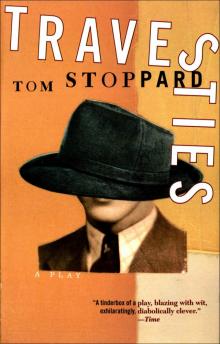 Travesties
Travesties Jumpers
Jumpers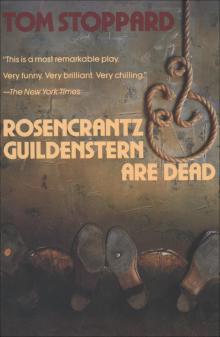 Rosencrantz and Guildenstern Are Dead
Rosencrantz and Guildenstern Are Dead Rock 'N' Roll
Rock 'N' Roll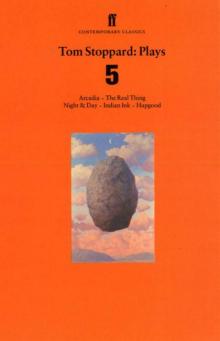 Plays 5
Plays 5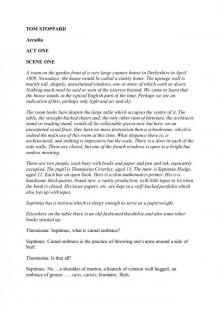 Arcadia
Arcadia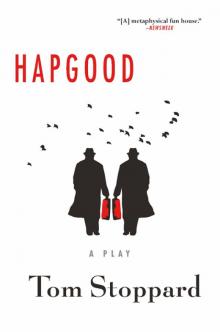 Hapgood
Hapgood Hapgood: A Play
Hapgood: A Play Every Good Boy Deserves Favor & Professional Foul
Every Good Boy Deserves Favor & Professional Foul The Coast of Utopia: Voyage, Shipwreck, Salvage
The Coast of Utopia: Voyage, Shipwreck, Salvage Lord Malquist & Mr. Moon
Lord Malquist & Mr. Moon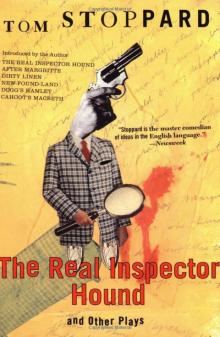 The Real Inspector Hound and Other Plays
The Real Inspector Hound and Other Plays Tom Stoppard Plays 1
Tom Stoppard Plays 1 Lord Malquist & Mr. Moon: A Novel
Lord Malquist & Mr. Moon: A Novel Shipwreck
Shipwreck Tom Stoppard Plays 3
Tom Stoppard Plays 3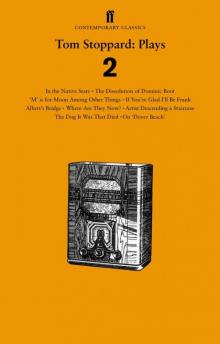 Tom Stoppard Plays 2
Tom Stoppard Plays 2 Rosencrantz and Guildenstern are dead. Arcadia
Rosencrantz and Guildenstern are dead. Arcadia